
Annual Review of Virology
Scope & Guideline
Transforming complex findings into accessible knowledge.
Introduction
Aims and Scopes
- Molecular Virology:
Exploration of viral structure, function, and replication mechanisms, including studies on viral proteins, RNA synthesis, and genetic systems. - Host-Virus Interactions:
Investigation of how viruses interact with their hosts, including immune evasion strategies, host cell responses, and the role of microbiomes in viral infections. - Viral Pathogenesis and Disease:
Analysis of the mechanisms through which viruses cause diseases in various hosts, alongside discussions on therapeutic interventions and vaccine development. - Ecological and Evolutionary Virology:
Examination of viruses in ecological contexts, including their roles in ecosystems, evolutionary dynamics, and their interactions with different biological systems. - Innovative Therapeutic Approaches:
Research into novel antiviral strategies, including phage therapy, RNA-based vaccines, and the development of agents targeting viral processes.
Trending and Emerging
- Microbiome-Virus Interactions:
A rising interest in how the microbiome influences viral infections and immune responses, highlighting the complex interplay between host-associated microbes and viral pathogens. - Advancements in Vaccine Technology:
Increased focus on innovative vaccine strategies, including mRNA technology and plant-based vaccines, driven by the urgent need for effective responses to emerging viral threats. - Viral Evolution and Ecology:
Growing attention to the ecological impacts of viruses and their evolutionary trajectories, emphasizing their roles in shaping host populations and ecosystems. - Phage Therapy and Antiviral Strategies:
Emerging research into bacteriophage applications as therapeutic agents against bacterial infections, reflecting a shift towards alternative treatments in the face of antibiotic resistance. - Structural Insights into Viral Mechanisms:
Enhanced emphasis on structural biology studies to elucidate viral functions and interactions at the molecular level, aiding in the development of targeted therapeutics.
Declining or Waning
- Traditional Plant Virology:
Topics focusing on conventional plant viruses and their interactions with crops are becoming less prevalent, possibly due to an increased interest in broader ecological and evolutionary considerations. - Historical Perspectives on Virology:
While historical insights have been valuable, recent publications suggest a shift towards more contemporary and applied research, reducing the emphasis on retrospective analyses. - Basic Virus Classification Studies:
Research primarily aimed at classifying new viruses without exploring their functional implications appears to be waning, as the field moves towards more integrative and systems biology approaches.
Similar Journals

VIRUS RESEARCH
Pioneering research that shapes the future of virology.VIRUS RESEARCH is a leading journal dedicated to the field of virology, published by Elsevier, and has been a cornerstone for researchers, professionals, and students since its inception in 1984. With an impressive impact factor, the journal is highly regarded, holding a Q2 category ranking in both Cancer Research and Infectious Diseases, as well as in Virology for 2023. Based in the Netherlands, it publishes high-quality, peer-reviewed articles that explore the intricate relationships between viruses and their hosts, novel therapeutic strategies, and advancements in virus biology. Researchers will find that it ranks 49th in Medicine - Infectious Diseases and 19th in Immunology and Microbiology - Virology according to Scopus, signifying its significant contribution and relevance in the academic world. VIRUS RESEARCH facilitates a platform for sharing groundbreaking discoveries, forming a vital part of the global scientific community, making it an essential read for those involved in the study of viral pathogens and their implications in medicine and biochemistry.

Viruses-Basel
Empowering Researchers with Unrestricted Access to KnowledgeViruses-Basel, published by MDPI, is a leading interdisciplinary journal focused on the field of virology and infectious diseases, offering a platform for the rapid dissemination of high-quality research. Established in 2009, this open access journal has become an essential resource for researchers and health professionals, ensuring that critical findings are readily available to a global audience. With an impressive Q1 ranking in Infectious Diseases and a Q2 ranking in Virology as of 2023, the journal reflects its commitment to impactful research, validated by its notable positions within Scopus categories—ranked #84 out of 344 in Medicine: Infectious Diseases and #27 out of 80 in Immunology and Microbiology: Virology. The journal adheres to high standards of academic rigor, and by embracing an open access model, it promotes unrestricted access to scientific knowledge, fostering collaboration among researchers, professionals, and students alike. Situated in Basel, Switzerland, the journal serves as a cornerstone in the dissemination of research findings related to viral diseases and their implications on public health.
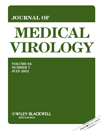
JOURNAL OF MEDICAL VIROLOGY
Advancing Virology: Pioneering Research for a Healthier Tomorrow.JOURNAL OF MEDICAL VIROLOGY is a prestigious academic publication dedicated to advancing the field of virology and infectious diseases. Published by WILEY, this journal has established itself as a cornerstone within the scientific community since its inception in 1977, and it will continue to provide cutting-edge research until 2024. With an impressive impact factor that places it in the Q1 quartile for both Infectious Diseases and Virology, the journal ranks 14 out of 344 in Medicine - Infectious Diseases and 6 out of 80 in Immunology and Microbiology - Virology according to Scopus metrics. Its focus encompasses a broad spectrum of topics, including viral pathogenesis, diagnostics, treatment strategies, and epidemiology, making it an essential resource for researchers, clinicians, and students alike. Although not an open-access journal, it provides valuable insights and accessible content for subscribers and libraries. The ongoing commitment to high-quality peer-reviewed articles makes JOURNAL OF MEDICAL VIROLOGY a vital platform for disseminating knowledge and fostering innovation in virology and related fields.

Journal of Virus Eradication
Catalyzing breakthroughs in epidemiology and immunology.Welcome to the Journal of Virus Eradication, a premier publication dedicated to advancing the field of virology and infectious disease research. Published by MEDISCRIPT LTD, this journal provides a vital platform for sharing cutting-edge research findings in key areas including epidemiology, immunology, and public health. With an impressive classification of Q2 in Epidemiology and Infectious Diseases for 2023, this journal exemplifies a commitment to high-quality scholarship and impactful research. The Journal of Virus Eradication is instrumental in disseminating knowledge that tackles viral threats, contributing to global health initiatives aimed at virus containment and eradication. Researchers, professionals, and students alike will find this journal an invaluable resource, making significant contributions to the scientific community and society at large.
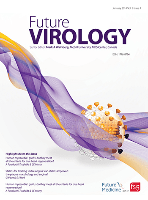
Future Virology
Exploring Tomorrow's Discoveries in VirologyFuture Virology, published by Future Medicine Ltd, is an essential journal dedicated to advancing the understanding of virology in the contemporary scientific landscape. With an ISSN of 1746-0794 and an E-ISSN of 1746-0808, this journal serves as a platform for researchers and practitioners in the field to publish high-quality, peer-reviewed articles that explore novel discoveries, innovative therapeutic strategies, and the implications of viral research on global health. Operating from the United Kingdom and maintaining a commitment to rigorous scientific inquiry, Future Virology is categorized in the Q4 Quartile for Virology according to the latest Scopus rankings, with a position of Rank #48/80 and a percentile of 40th in the Virology category. Although it currently does not offer open access, the journal strives to disseminate critical insights that benefit a wide range of professionals, researchers, and students engaged in virology and related fields. By bridging the gap between basic research and practical applications, Future Virology plays a crucial role in fostering innovation and collaboration in the ever-evolving virology landscape.
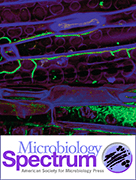
Microbiology Spectrum
Fostering collaboration through open access innovation.Microbiology Spectrum is a prominent peer-reviewed journal published by the American Society for Microbiology, dedicated to advancing the field of microbiology through the dissemination of high-quality research. Since its inception in 2013 and continuing until 2024, the journal has established a strong presence in key domains such as microbiology, immunology, cell biology, and ecology, achieving impressive quartile rankings including Q1 in Infectious Diseases and Q1 in Immunology and Microbiology as of 2023. With an emphasis on open access to its scholarly content, Microbiology Spectrum aims to foster collaboration and knowledge sharing among researchers, professionals, and students alike. The journal's scope encompasses a diverse range of topics pertinent to the field, making it an essential resource for anyone involved in microbiological research and its applications. Researchers looking to publish their findings in a respected journal will find Microbiology Spectrum's robust impact factor and Scopus rankings serve as testament to its significance and influence within the academic community.
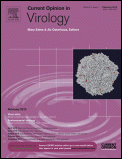
Current Opinion in Virology
Championing Comprehensive Reviews in VirologyCurrent Opinion in Virology, published by Elsevier Science Ltd, is a premier journal dedicated to advancing knowledge in the dynamic field of virology. Established as a respected source of comprehensive reviews and critical evaluations, this journal boasts an impressive impact factor and has achieved a distinguished Q1 category ranking for virology, signifying its pivotal role in the academic community. Serving researchers, professionals, and students alike, Current Opinion in Virology presents insightful contributions that delve into the latest developments, emerging trends, and pivotal challenges facing virology today. With its Scopus ranking placing it in the top 15% of its field, the journal provides unparalleled access to cutting-edge research that informs both basic and applied aspects of virology. Although not an open-access journal, it offers options for subscriptions that ensure accessibility to critical content. As the field continuously evolves, Current Opinion in Virology remains at the forefront, bridging the gap between research and clinical application, making it an essential resource for all in the virology community.

VIRAL IMMUNOLOGY
Pioneering insights into viral immunology for a healthier future.Viral Immunology, published by Mary Ann Liebert, Inc, stands as a prominent journal dedicated to advancing the understanding of the interplay between viral infections and host immune responses. With a strong focus on immunology, molecular medicine, and virology, the journal provides a platform for the dissemination of high-quality research findings and innovative methodologies that could shape the future of these critical fields. Although it currently holds a Q3 rating across its relevant categories and a respectable ranking within the Scopus database, Viral Immunology continues to strive for excellence with a commitment to publishing influential research that informs both academic and clinical practices. The journal accepts submissions in various formats—original research, reviews, and commentaries—catering to a diverse readership that includes researchers, professionals, and students engaged in the biological and medical sciences. Readers can anticipate insightful articles that address urgent challenges in immunological responses to viral infections, paving the way for new therapeutic strategies and public health initiatives.
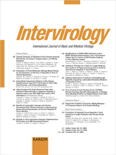
INTERVIROLOGY
Advancing virology through innovative research.INTERVIROLOGY is a leading academic journal dedicated to advancing the field of virology and infectious diseases, published by KARGER. With a commendable history since its inception in 1973, the journal is currently poised to explore innovative virological research through to 2024. INTERVIROLOGY is indexed with the ISSN 0300-5526 and E-ISSN 1423-0100, reflecting its commitment to maintaining high scholarly standards. The journal is categorized within the Q3 quartile for both Infectious Diseases and Virology as of 2023, demonstrating its relevance and contribution to the academic community. With Scopus rankings placing it as #130 in Infectious Diseases and #41 in Virology, INTERVIROLOGY serves as an essential resource for researchers, professionals, and students seeking cutting-edge insights and discoveries in virology. While it currently operates under a subscription model, its rigorous peer-review process ensures a high quality of published content, making it a cornerstone for those dedicated to understanding and combating viral diseases.

ANTIVIRAL THERAPY
Advancing the frontier of antiviral research.ANTIVIRAL THERAPY is a prominent academic journal dedicated to the field of infectious diseases and pharmacology, published by SAGE Publications Ltd in the United Kingdom. Since its inception in 1996, this journal has become an essential platform for disseminating cutting-edge research and innovative therapeutic approaches for viral infections, making significant contributions to advancements in medical science. With an HIndex indicating the quality and influence of its published work, ANTIVIRAL THERAPY holds prestigious rankings in its categories, including Q3 in Infectious Diseases and Pharmacology as of 2023. While it currently does not offer open access, the journal provides valuable insights that are crucial for researchers, healthcare professionals, and students engaged in antiviral research and treatment strategies. As it converges towards 2024, the journal continues to play a vital role in shaping the understanding and management of viral diseases, making it a critical resource for anyone involved in this important field of study.